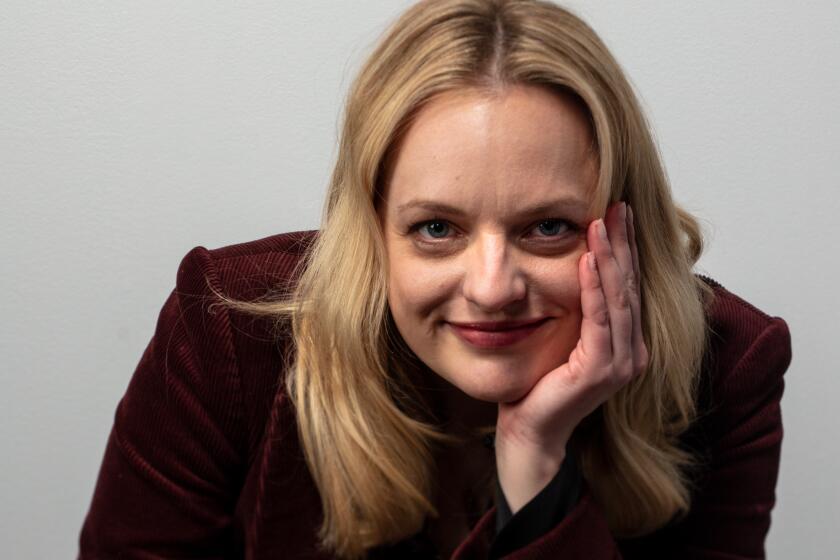Tamar-kali takes the score for ‘Shirley’ on a wild ride tinged with horror and humor
One of the freshest new voices in Hollywood film music, Tamar-kali had a breakout year in 2020 composing four very different scores — for Dee Rees’ “The Last Thing He Wanted,” Kitty Green’s “The Assistant,” the timely documentary “John Lewis: Good Trouble” and, perhaps most strikingly, for Josephine Decker’s “Shirley.”
Decker knew from the get-go that she wanted a female voice for her eccentric film about horror author Shirley Jackson, played to the hilt by Elisabeth Moss.
“The two main characters, Rose [Odessa Young] and Shirley, are in this kind of entwined, enmeshed, maybe slightly codependent relationship,” said Decker, “and they’re both in the process of finding their voice in different ways. Shirley is a mature person, but she’s finding a voice for this character in her book, ‘Hangsaman,’ and she’s a bit lost in terms of how her writing is going.
“And then Rose is struggling to find her place in her new marriage and how she’s going to balance her desires to pursue her academic career. So the voice, metaphorically and figuratively, was just important.”
Tamar-kali, with her unique musical upbringing in classical and choral music as well as punk rock, was just the voice for the task. She wrote a chamber score for string quartet and piano that crackles and rubs like dry tinder, complementing the film’s handmade, unvarnished visual style.
And she sings. Inspired by the unusual tones of the Bulgarian vocalists Le Mystère des Voix Bulgares, Tamar-kali created a chorus of wild female voices — all coming from the same woman: herself. It’s an apt metaphor for a film about three different women and the many voices inside the main character’s head.
“You don’t want to frighten the director,” Tamar-kali said. “I’d rather have a director frighten me. But with Josephine, she definitely was like, ‘Come on with the come on.’ And I realized: OK, just go for it. Just swing for the fences on this one. Just howl. Start whoopin’.”
‘Invisible Man’ and ‘Shirley’ star Elisabeth Moss still relies on nerves to tell her, ‘This scene, this moment is important. ... I crave that feeling.’
The composer created unique textures and did “gibberish kind of whispering,” layered into three-part harmonies in search of a “home chord” that represented the trio of women. “There was this one moment,” she remembered, “where, after I had accomplished the thing I was creating, I literally sat back in my chair and was like: What was that?”
As to her direction notes, Decker said it was mostly, “‘That weird thing you did? Do a lot more of it.’ There’s a lot of dreamy, subconscious things that happen in the movie. Shirley’s writing her book, and there are these sections where she’s finding her writing, and you’re hearing her writing through voice-over, and you’re feeling that discovery. And so Tamar kind of wilding out as a vocalist was very much in line with what was happening in the mind of Shirley.”
Moss laughed when she said that “knowing Jo [Decker], I feel like this was the most mainstream score that we could have ever possibly had. This is some straight-up John Williams score for Jo.”
As wild and borderline horror as the score gets, there’s also humor — as in a scene where Shirley is sitting on a porch swing and flirtatiously bumping into Rose.
“You hear a string plucked, and a chord plucked, and then just silence,” said Moss. “And it sounds so playful — it sounds like Shirley kind of plucking at Rose, you know what I mean? Like a cat playing with a mouse. What [Tamar-kali] did was really capturing Shirley’s sense of humor and playfulness.”
In a climactic scene, Tamar-kali’s one-woman chorus hovers over Shirley and Rose as they stand on a high precipice, contemplating their next steps in this man’s world. The conclusion finds Rose telling her husband (Logan Lerman) that she’s not going back to being his “little wifey,” and the score plays the moment with liberated, mischievous string pizzicatos and high piano notes.
“She found the little moments inside the scenes,” Moss said. “Rather than just composing straight to what was happening on the surface of the scene, she found the underbelly of it a lot of the time — and managed to somehow, at times, make it beautiful and lyrical and sound like a gorgeous, pretty score. And then there are times when it’s just like straight-up weird, and they somehow are cohesive.”
“Which, again, I feel like it’s very Shirley Jackson,” the star added, “who’s very capable of being really weird and really out there and really dark, and then also could create something totally beautiful and lyrical.”
More to Read
From the Oscars to the Emmys.
Get the Envelope newsletter for exclusive awards season coverage, behind-the-scenes stories from the Envelope podcast and columnist Glenn Whipp’s must-read analysis.
You may occasionally receive promotional content from the Los Angeles Times.








